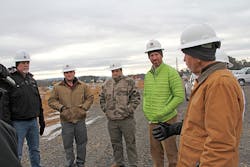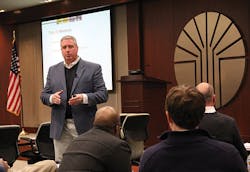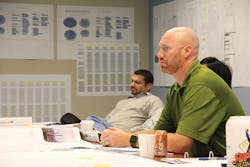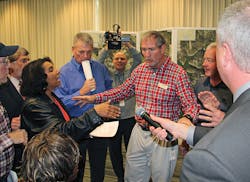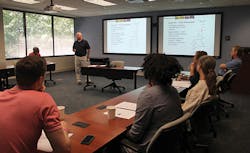Georgia Transmission Corp. (GTC) has crafted a unique and successful approach to project management and community outreach that stands out in the electric utility industry. With an emphasis on cultivating and employing soft skills — the attentive and intentional stakeholder outreach that sometimes gets lost in the industry’s work — GTC has earned a reputation among stakeholders as being a great utility with which to work.
Georgia’s electric utilities locate new transmission facilities without government oversight. They are the sole determiner for both the need and location for new facilities. GTC’s targeted public outreach plays a significant role in preserving this regulatory environment and fostering cooperation among key stakeholders associated with project development, including property owners and local elected officials.
This unique environment is sustained by the time, thought and consideration GTC has invested into its approach to project management and stakeholder outreach. The organization has crafted an innovative training program that puts these soft skills at the forefront for potential project managers. Known as Project Management—The GTC Way, this 10-month program is geared toward GTC associates who think they may want to be a project manager in the future, are currently part of a project team or are interested in developing general project management skills.
Education Program
The program features 73 hours of classroom time as well as an additional 20 hours of on-the-job training participants must complete to graduate from the program. All of the classes, which range from budgeting and scheduling to how to interact with elected officials, were developed and are taught by in-house experts.
Department heads also serve as educators, offering insights on how project managers can best work with their departments to achieve common goals. The departments do not come in and merely give overviews of what they do on a day-to-day basis. Rather, they concentrate on how they can connect with GTC’s future project managers. Focusing on actual challenges that have cropped up during past projects, participants are exposed to real-world examples of how the various departments have worked in unison to fix a problem.
The final assignment in the course is a case study where class members are divided into teams and tasked with putting into practice the methods learned during the program.
An Ongoing Project
Project Management—The GTC Way is the latest evolution of the utility’s ongoing efforts to prepare its workforce for the variety of challenges they will face on the job. In 2000, GTC developed a shorter program geared toward its land services agents that focused on clearing and construction activities, maintenance activities, environmental impacts during a project and internal organizational expectations of employees.
Most of those programs have since rolled up into Project Management—The GTC Way as part of the utility’s preparations for anticipated workforce shortages. The organization is faced with the reality that a large portion of its project managers will be retiring within the next decade. In fact, the electric utility industry as a whole is projected to lose 30% of its workforce over the course of the next five years.
As a result, GTC was confronted with losing valuable experience and leadership rather quickly. In 10 years, the utility’s project managers would be an entirely different group of people, making it imperative for the utility to prepare for the future.
Management and Values
The program covers a diverse set of topics, but its most unique approach is preparing participants to be strong advocates for GTC values. The organization understands the importance of having its project managers, as well as all of its associates, properly trained in how to deal effectively with a wide variety of stakeholders, including landowners, elected officials, economic developers and others.
The external affairs team also is deeply integrated into all project teams. A public affairs representative is assigned to each project from the beginning to ensure community relations remain at the center of each project. Often an afterthought when compared to the heavy lifting associated with planning, construction and maintenance, this type of outreach is nonetheless essential to the overall process. It also is a direct reflection of GTC’s core values: honesty, ethics and fairness.
These values are integrated into everything the organization does, and they definitely show up in how project managers are trained and how they operate in the field. One question senior project managers often ask when working on an issue for an EMC, elected official or landowner is “What is the right thing to do?” GTC prides itself on having its people work very closely with its EMC customers, with an emphasis placed on doing right by them.
Cultivating Relationships
To help prepare its associates for this level of intimate engagement, Project Management—The GTC Way puts the focus on building and cultivating relationships, both internally and externally, with an eye on ensuring a smooth and productive work process for the project.
Aside from the intangible benefits that come from cultivating relationships, building positive and mutually beneficial working relationships also has an impact on the scheduling, budgeting and logistical challenges that often arise on a project. A trusted relationship with a landowner, community leader or internal team member breeds honesty, openness and transparency. These three traits ensure, when challenges arise, efficient and effective solutions are sought out in good faith.
Georgia passed legislation in 2004 and 2006 that required greater public involvement for certain transmission projects through public meetings. GTC was already engaging in this type of stakeholder outreach. During the public meetings, property owners are invited to ask questions and share their feedback about a project with GTC representatives. Sometimes the feedback can be critical and emotional, and GTC has developed a session to prepare its associates for these types of situations.
The training program includes a simulated public meeting with GTC associates taking on the roles of the various stakeholders who typically attend. Participants are tasked with walking the stakeholders through a hypothetical project, and managing the flow and tenor of the ensuing conversation. Every potential scenario of a public meeting is acted out, and participants work with instructors after the simulation to discuss what happened, how the various situations could have been handled differently and why the public information process is so essential to the broader project management puzzle.
Simulations
A recent stimulation featured an actor coming into the meeting dressed as a distraught elderly woman with a cane. The woman put on a dramatic show about the impact of the proposed project on her family, her livelihood and her health. The woman threatened to call her congressman and the media to stop the proposed project. While it was entertaining to watch, it also offered a valuable lesson for the participants on how to be respectful when confronted with a challenging situation.
Instructors coach program participants to imagine they are working with a family member, emphasizing a personal touch on what can sometimes be contentious issues of property negotiations and project footprints. Tactics like this can help to reframe the perspective for GTC representatives while also fostering respect and appreciation for the process.
GTC also hosts mock sessions focusing on expert witness testimony, media relations and elected official outreach. In the latter, actual county commissioners participate and role-play various scenarios for potential meetings. This level of preparation and intentional focus on building strong relationships has helped the utility to lead the way in Georgia’s unique regulatory environment.
Community Benefit
GTC’s approach to stakeholder outreach, coupled with its emphasis on the organization’s core values of honesty, fairness and ethics, have helped to ensure Georgia’s regulatory landscape has remained largely unchanged, enabling industry experts to work directly with communities to properly plan, build and maintain power lines.
This concerted approach on outreach and relationship building also has helped GTC to use eminent domain very rarely and only after all other avenues have been explored. In fact, in 2014, every negotiation was settled without the use of eminent domain. The utility’s emphasis on relationships and communicating with communities has helped to keep that number below most industry standards.
Project managers must have excellent people skills, and be respected by their team members and the communities they are working to serve. By teaching participants to go the extra mile in their job, GTC’s project managers have been able to earn that respect while also ensuring the lights stay on for the people of Georgia. Such results would not be possible without the development of and emphasis on using the soft skills with all invested parties — including EMC members, landowners, elected officials and the local media.
Angela Battle is manager of the project management team. She has been with Oglethorpe Power Corp. and Georgia Transmission Corp. for a combined 21 years in the areas of system planning, project engineering, corporate benchmarking and project management.
Charles “Bubba” McCall is group lead of the transmission project management team for Georgia Transmission Corp. He has been with Oglethorpe Power Corp. and GTC for a combined 37 years in the areas of generation projects construction management, transmission line and civil design engineering, and project management.
Chuck Scarborough is the manager of land services for Georgia Transmission Corp. He has been with the utility for 16 years. Prior to that, he spent 15 years with Texas utilities based in Dallas, Texas. He has more than 30 years of experience dealing with land acquisition, environmental compliance, and legislative and regulatory issues.

